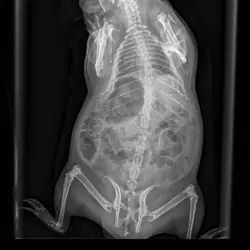piggydobz
Junior Guinea Pig
Hiya,
Our piggie Howard has suspected bladder stones. Unfortunately the vets he has seen haven’t been the quickest to diagnose anything and its been about 3 weeks since the first symptoms started. Vets gave him a week of Baytril to try incase UTI, however there was no improvement.
In the last few days he’s started squealing almost every time he pees. Other than that, he’s eating fine and not lost any weight and seems cheerful enough, mostly annoyed and uncomfortable I think.
We’ve upped his metacam to 0.4ml twice a day and giving him regular syringes of bottled water. We’re regularly putting in a paper towel to check he is still peeing ok. We’ve also done a home urine sample, which came up negative for blood.
He is booked in at our new more cavvy savvy vets for first Monday morning for an examination and X-ray. We’re all ready on standby for an emergency vets trip if he needs it, but I’m hoping he can hold on til Monday.
Is there anything else we can do to keep him more comfortable until then?
Our piggie Howard has suspected bladder stones. Unfortunately the vets he has seen haven’t been the quickest to diagnose anything and its been about 3 weeks since the first symptoms started. Vets gave him a week of Baytril to try incase UTI, however there was no improvement.
In the last few days he’s started squealing almost every time he pees. Other than that, he’s eating fine and not lost any weight and seems cheerful enough, mostly annoyed and uncomfortable I think.
We’ve upped his metacam to 0.4ml twice a day and giving him regular syringes of bottled water. We’re regularly putting in a paper towel to check he is still peeing ok. We’ve also done a home urine sample, which came up negative for blood.
He is booked in at our new more cavvy savvy vets for first Monday morning for an examination and X-ray. We’re all ready on standby for an emergency vets trip if he needs it, but I’m hoping he can hold on til Monday.
Is there anything else we can do to keep him more comfortable until then?
